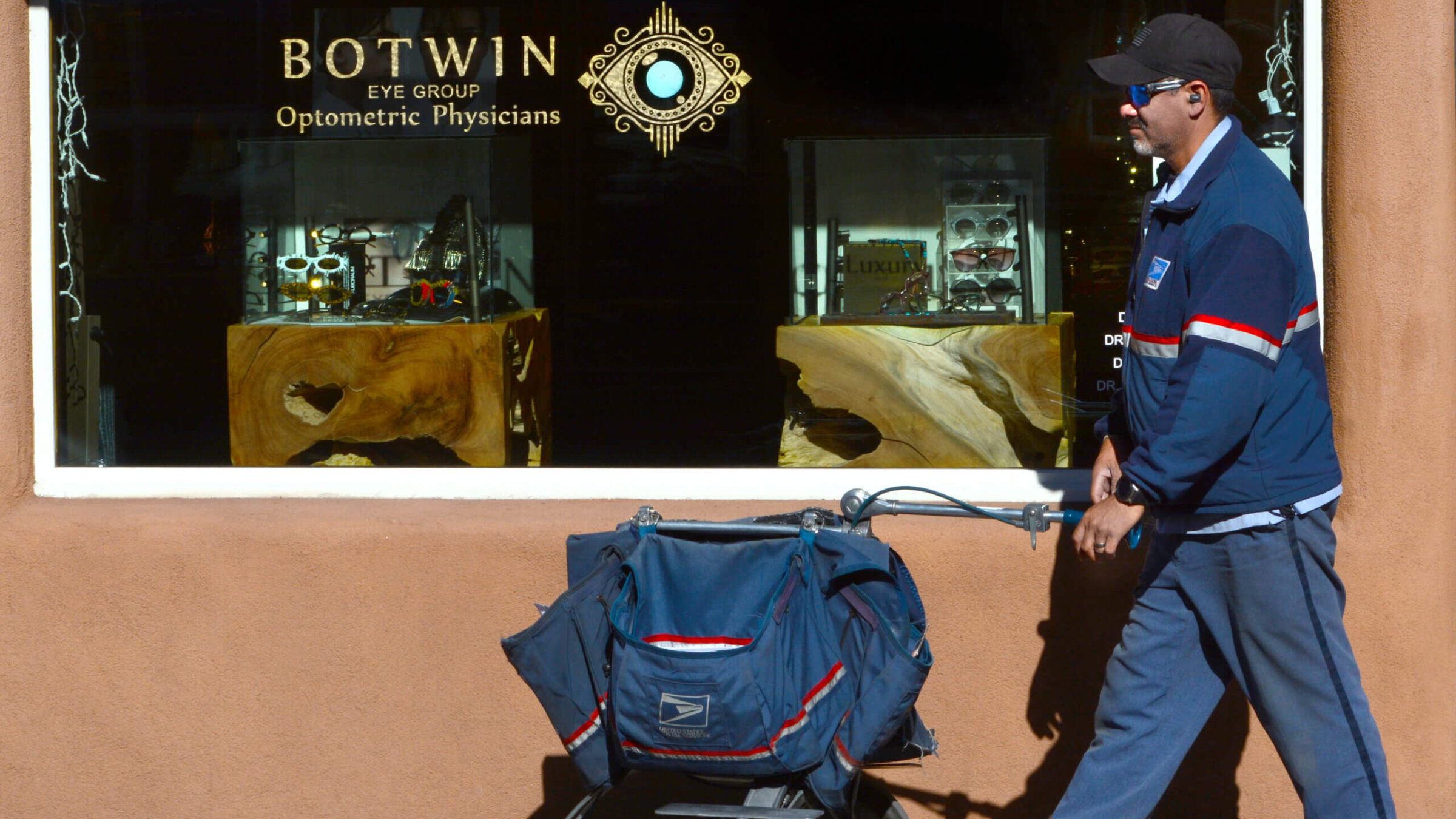Must your employer accommodate your Shabbat observance? That’s up to the Supreme Court
The decision in Groff v. DeJoy will have a significant impact on American Jews and other religious minorities who require accommodation of their religious practices

A U.S. Postal Service mailman with a mail delivery cart delivers mail to businesses in downtown Santa Fe, New Mexico. The U.S. Supreme Court’s latest church-state case involves a U.S. Postal Service employee who sought religious accommodations for his Sabbath observance. Photo by Robert Alexander/Getty Images
Editor’s note: On June 29, 2023, the U.S. Supreme Court ruled in favor of the plaintiff Gerald Groff, requiring that employers must meet a higher legal standard to deny religious accommodations in the workplace. As details of the decision unfold, we are republishing this op-ed from two months ago that explores the legal arguments behind the case.
How far must employers go to accommodate religious employees in the workplace?
This is the question the U.S. Supreme Court debated in its latest blockbuster church-state case. The answer is likely to have a significant impact on American Jews and other religious minorities who require accommodation of their religious practices, such as Sabbath observance.
Current Supreme Court precedent does not require employers to accommodate their employees’ religious practices if doing so imposes an “undue hardship,” which the courts have interpreted very broadly. But recently, a broad consensus has emerged supporting the expansion of workplace protections, making it one of the few church-state questions that has united Jewish institutions across the political and religious spectrums.
While oral arguments last week largely reflected this broad consensus, it remains unclear how far the court will go in requiring employers to accommodate religious employees.
The case before the court, Groff v. DeJoy, involves a U.S. Postal Service employee, Gerald Groff, who sought to have his Sunday observance of the Sabbath accommodated. While his job did not initially require working on his Sabbath, when the Postal Service entered an agreement to deliver packages for Amazon on Sundays, Groff was required to change work days as well. ( Full disclosure: I co-authored an amicus brief in Groff v. DeJoy on behalf of the Orthodox Union supporting the petitioner.)
Groff said his religious convictions prohibited him from doing so. He ultimately resigned when USPS would not accommodate him. He then filed suit against the Postal Service, arguing that it had violated Title VII of the Civil Rights Act.
A federal court of appeals found in favor of the Postal Service, determining that the law did not require the Postal Service to provide an accommodation where doing so would have even minimal “negative impacts on the employer’s operations, such as on productivity or quality, personnel and overtime costs, increased workload on other employees, and reduced employee morale.”
Title VII requires employers to “reasonably accommodate” an employee’s religious practice unless they present an “undue hardship.” The words undue hardship certainly implied that employers would have to endure some hardship — just not “undue” hardship — when accommodating religious practices in the workplace.
But in the 1977 case TWA v. Hardison, the Supreme Court famously diluted that standard. The decision stated that requiring an employer to “bear more than a de minimis cost” — that is, a trivial or minor cost — “is an undue hardship.” If an accommodation entailed expending more than a minor cost, an employer was off the hook.
TWA had refused to accommodate the plaintiff’s Saturday Sabbath observance. But armed with its new interpretation, the court held that denying the Sabbath accommodation did not violate federal law even if TWA could have gotten a voluntary replacement by paying another employee overtime. Paying someone else overtime to make accommodating the Sabbath possible entailed more than a trivial cost, and so it was more than the law required of TWA.
Not surprisingly, religious minorities have long chafed at the Court’s bait-and-switch. The court’s current case, Groff v. DeJoy, therefore represents an opportunity to remedy that jurisprudential wrong.
When the Supreme Court decided to review the case, most analysts assumed that the justices aimed to raise the standard employers had to meet when it came to accommodating religion in the workplace. The court received an avalanche of amicus (friend of the court) briefs in Groff from religious minorities and a slew of Jewish groups.
As rarely happens of late in church-state cases, nearly the entire alphabet soup of Jewish organizational life — from the ADL and AJC to the OU and the NCYI to ZOA and COLPA —all filed supporting Groff in his suit against the Postal Service.
The themes across these various organizations hit similar notes: Title VII was intended to protect religious minorities, like American Jews, who are particularly vulnerable to workplace conflicts because they engage in practices that differ from the norm. And religious minorities, including Jews, are significantly overrepresented in the pool of plaintiffs filing failure-to-accommodate complaints, indicating that religious minorities bear the brunt of the current legal standard.
This growing consensus, in many ways, was manifest during oral argument. Neither party supported the stingy de minimis standard for religious accommodations. Groff’s attorney argued for an interpretation of “undue hardship” typical in other areas of the law — one that required employers to accommodate unless it led to “significant difficulty and expense.”
The solicitor general, representing the Postal Service, also veered from the de minimis standard, conceding that it would be more accurate to say — “at the abstract level” — that an employer’s obligation to accommodate extends until they incur “substantial costs.” Justice Neil Gorsuch noted this agreement — in his view, how different are the words “substantial costs” and “significant difficulty and expense”? Can’t we all just get along?
This agreement between the parties provides strong indication that the court’s decision will ultimately expand the protections afforded religious employees in the workplace. But beneath this “kumbaya-ing,” as Justice Elena Kagan described it, lurked more significant differences. Groff argued that the judicial record under Hardison had been a disaster. And the only way to fix that was to overturn Hardison’s de minimis standard. Without doing so, employers would remain free, in the main, to continue rejecting requests for accommodation.
But the solicitor general painted a very different picture. In her view, lower courts had actually done a relatively decent job — even if with some errors here and there — of protecting religious employees in the workplace. This was because, in her view, the court’s old standard left some wiggle room, allowing courts to demand employers do more than the bare minimum to, for example, accommodate employees’ religious dress and expression.
When Justice Samuel Alito challenged the solicitor general’s rosy characterization of the judicial record by holding up a mound of amicus briefs from “minority religions — Muslims, Hindus, Orthodox Jews, Seventh Day Adventists,” she responded that those briefs did not “accurately portray[]” the record. As a result, in the government’s view, the Court could rehabilitate Hardison and thereby have its cake and eat it, too: It could require employers to provide accommodations so long as those accommodations didn’t entail substantial costs and it could accomplish this legal maneuver without discarding Hardison and thereby unsettling the law.
Some of the justices seemed inclined toward the government’s approach, and one can easily see why. Congress has had numerous opportunities since 1977 to reject Hardison by adding words to Title VII that require more of employers. Given that it hadn’t done so, maybe it wasn’t the court’s job to overturn Hardison. On this view, maybe it would be best to leave Hardison in place and just tinker a bit with its formulation to demand more of employers. Maybe — in Gorsuch’s words — that would be “a good day’s work.”
But by the end of oral argument, problems with this tinkering approach began to surface.
Yes, the government was inclined to discard the de minimis standard and thereby expand the protections afforded religion in the workplace. But leaving Hardison in place meant leaving its holding in place that Title VII did not require an employer regularly paying another employee premium wages to cover Sabbath shifts. Expanding the protections afforded an employee’s Sabbath observance would, in this way, require a wholesale rejection of Hardison — something the government continued to resist.
Some justices seemed OK with that outcome. Justice Sonia Sotomayor, for example, argued that “at a certain point, we affect the corporation’s bottom line, and that’s not our choice to decide whether we want to do that, because the economy needs to run on incentives to make money.”
Others seemed far more skeptical. Alito, for example, noted repeatedly that ultimately, employers could solve these problems with “dollars and cents.” The solicitor general responded that — unless the court overturned its precedents — the law as it stands does not require employers to make regular overtime payments. That remains true even if that employer is Amazon and the cost of making those overtime payments isn’t even a rounding error on the company’s bottom line.
So where does this leave us? It seems clear that the court will expand the protections afforded to religious employees in the workplace. Employers will likely be required to do more than bare the most minimal of costs when it comes to, for example, accommodating religious expression and dress.
But how far will employers have to go — and how much money will they have to spend — to accommodate Sabbath observance in the workplace? Here, the Court’s opinion may be up for grabs. And in many ways, it brings the crux of the debate into full refrain.
Much has been made of the impact religious accommodations can have on other employees in the workplace. But in some of the most contested cases, the reality is that employers can solve those problems through incentivizing other employees to voluntarily take on those shifts through overtime pay.
Such cases ultimately pit a company’s bottom line against the needs of religious minorities to retain their jobs. No doubt, there is something ironic in this dispute about Sotomayor championing big business and Alito championing workers’ rights. And yet, this is precisely where we stand after last week’s oral argument, wondering how the court might split the difference.
When the court’s opinion is handed down, religious employees will likely receive more workplace protections. But whether employers will have to invest resources to provide ongoing protections for the Sabbath still very much hangs in the balance.
To contact the author, email [email protected].























